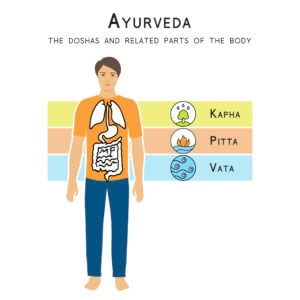Why Ayurveda is Gaining Popularity in Today's Health Practices
Why Ayurveda is Gaining Popularity in Today's Health Practices
Blog Article
Why You Have to Obtain It: The Transformative Power of Ayurveda Explained
Ayurveda, a time-honored system of medicine, supplies an unique point of view on wellness that goes beyond mere sign monitoring. As we discover the core principles and methods of Ayurveda, it comes to be evident that its transformative potential prolongs much past traditional health and wellness standards-- elevating the inquiry of exactly how it could improve your understanding of health.
Understanding Ayurveda's Core Principles
Ayurveda, typically called the "science of life," is rooted in an alternative technique to wellness that links the physical, mental, and spiritual dimensions of health. Central to Ayurveda are the principles of the five aspects, referred to as "Pancha Mahabhuta," which consist of planet, water, ether, air, and fire. These aspects incorporate to create 3 main powers, or "doshas": Vata, Pitta, and Kapha, each representing different combinations of psychological and physical qualities.


Comprehending these doshas is essential for recognizing an individual's unique constitution, or "Prakriti," which guides personalized health and wellness methods. Ayurveda emphasizes balance, advocating for a lifestyle that harmonizes these powers via diet, herbal solutions, and day-to-day regimens. Ayurvedic concepts insist that health and wellness is not just the lack of illness however a state of optimal vitality.
The technique of mindfulness and self-awareness is fundamental, motivating people to establish a deeper connection with their bodies and the environment. By identifying the interaction of emotional and physical elements, Ayurveda promotes an extensive understanding of health that empowers people to organize their wellness, fostering a course in the direction of alternative improvement.
Advantages of Ayurvedic Practices
Regularly including Ayurvedic methods right into life can yield a plethora of benefits that enhance total health. These classic traditions concentrate on accomplishing harmony within the spirit, mind, and body, leading to enhanced physical health, psychological clarity, and psychological balance.
One significant benefit of Ayurvedic practices is their capability to advertise gastrointestinal health and wellness. Individualized dietary referrals, based upon an individual's dosha, can optimize vitamins and mineral absorption and decrease intestinal problems. Additionally, Ayurvedic natural herbs and spices, such as turmeric and ginger, possess anti-inflammatory residential properties that can assist in the prevention and monitoring of chronic illness.
Additionally, Ayurvedic techniques emphasize the significance of everyday regimens, recognized as dinacharya, which cultivate stability and predictability in one's life. This consistency can decrease anxiety degrees and improve performance. Mindfulness techniques, including meditation and yoga, not only grow psychological strength yet additionally boost emotional law.
Finally, by promoting a connection to nature and highlighting alternative living, Ayurveda motivates people to involve in self-care and cultivate a sense of area. On the whole, the integration of Ayurvedic practices can lead to a more balanced, dynamic, and fulfilling life.
Key Components of Ayurvedic Healing
At the core of Ayurveda lie 3 main parts: the idea of doshas, the emphasis on equilibrium, and the alternative method to health and wellness. The doshas-- Vata, Pitta, and Kapha-- represent the unique mixes of the five elements that govern private constitutions.
Balance is a recurring motif in Ayurvedic healing, mirroring the idea that wellness emerges from consistency within the body and between the specific and their atmosphere. Interruption of this balance can cause disease, demanding targeted interventions to recover stability.
Furthermore, Ayurveda welcomes an alternative strategy, thinking about physical, psychological, and spiritual elements of wellness. This extensive point of view recognizes that psychological health and way of life options dramatically affect physical useful content health and wellness.
Integrating Ayurveda Into Daily Life
Integrating the principles of Ayurveda into every day life can dramatically improve total health and advertise a much deeper connection to one's body and setting. By taking on Ayurvedic methods, people can grow equilibrium and consistency within themselves, adapting to their distinct constitution or dosha.

Including natural remedies and natural active ingredients right into read review personal care routines can additionally enhance Ayurvedic concepts. As an example, utilizing oils for self-massage, referred to as abhyanga, advertises flow and leisure. Furthermore, integrating reflection or yoga exercise can boost mental clarity and emotional stability, fostering an all natural approach to health.
Finally, understanding ecological aspects, such as environment and seasonal adjustments, makes it possible for people to readjust their lifestyles appropriately, making certain that their techniques continue to be efficient and encouraging - Ayurveda. By weaving these concepts right into daily life, one can experience profound benefits, causing a more well balanced and meeting presence
Individual Improvements With Ayurveda
The implementation of Ayurvedic principles right into daily routines commonly brings about substantial individual improvements, as individuals begin to experience profound shifts in both physical and mental health and wellness. By accepting practices such as nutritional adjustments, herbal supplements, and conscious meditation, many record boosted power levels, improved food digestion, and improved emotional resilience.
Individuals commonly locate that the all natural approach of Ayurveda addresses not just signs and symptoms, yet underlying discrepancies within the mind More Info and body. As an example, embracing a customized dietary routine based on one's dosha can bring about weight monitoring, decreased swelling, and much better overall vigor - Ayurveda. The consolidation of everyday self-care rituals, such as oil drawing or Abhyanga (self-massage), cultivates a much deeper connection to one's body, advertising self-awareness and nurturing mental health.
As specialists dig much deeper into Ayurvedic approach, they frequently find a restored sense of objective and clarity in their lives. This transformative journey motivates people to cultivate mindfulness, leading to much healthier partnerships and a greater gratitude for the here and now minute. Ultimately, Ayurveda empowers individuals to organize their wellness, facilitating a enduring and significant change in their lives.
Verdict
The transformative power of Ayurveda lies in its holistic approach, promoting harmony among body, mind, and spirit. By recognizing individual doshas and applying customized techniques, Ayurveda cultivates optimum health and emotional resilience. Its integration right into every day life urges mindful living and deeper links within areas. Inevitably, welcoming Ayurveda can result in profound personal changes, enhancing total health and helping with a much more balanced and harmonious existence. The principles of Ayurveda supply valuable understandings for growing a satisfying and lively life.
As we check out the core principles and practices of Ayurveda, it becomes evident that its transformative possible extends much beyond traditional wellness paradigms-- elevating the question of just how it may reshape your understanding of health.
Ayurveda, commonly described as the "scientific research of life," is rooted in a holistic method to health that intertwines the physical, psychological, and spiritual dimensions of health. At the core of Ayurveda lie three main components: the idea of doshas, the focus on balance, and the all natural approach to wellness. Eventually, Ayurveda encourages individuals to take cost of their health, promoting a significant and long-term change in their lives.
By identifying individual doshas and executing customized practices, Ayurveda promotes ideal health and wellness and psychological strength.
Report this page